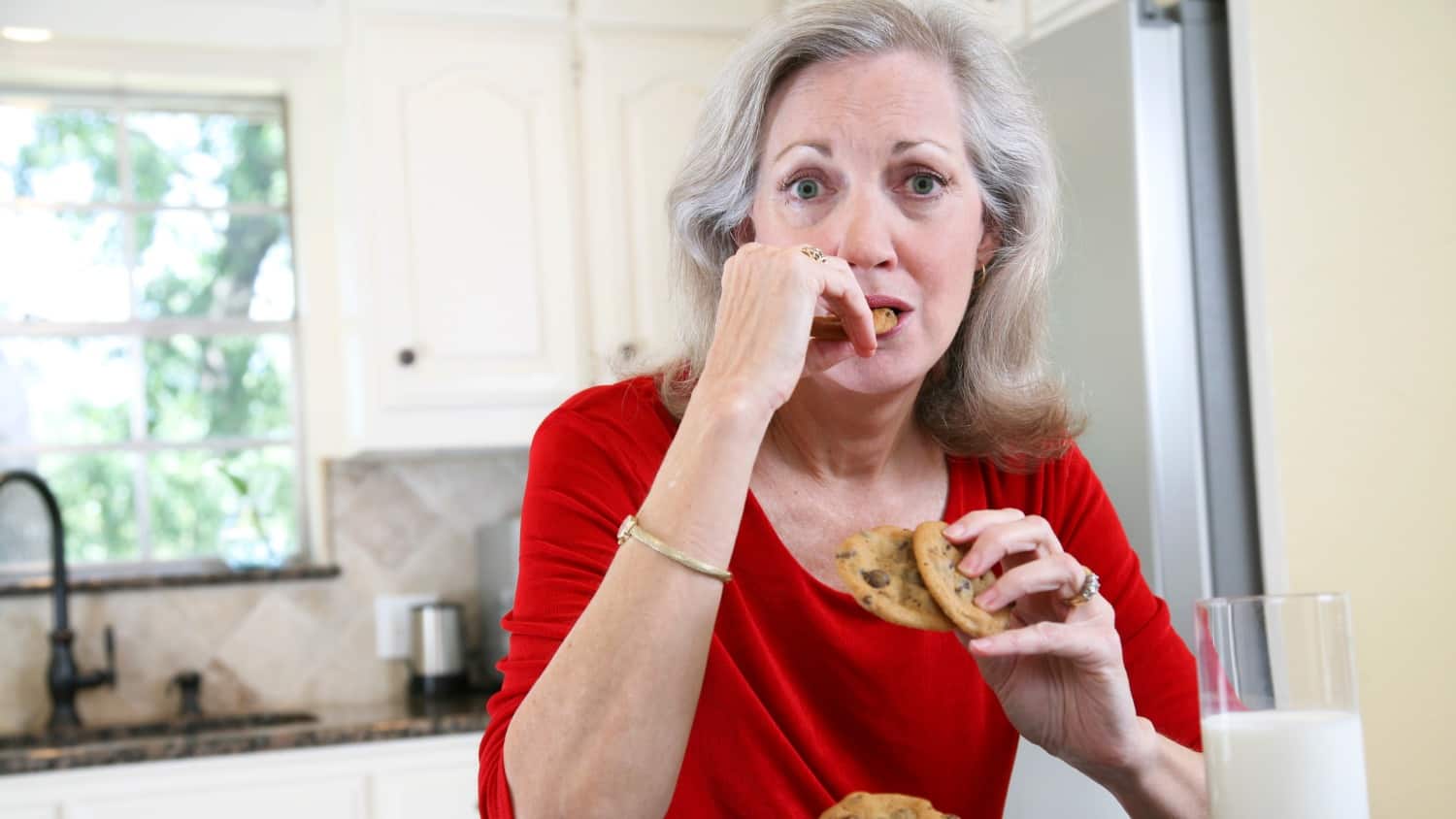
How to Manage Your Emotions Instead of Eating to Avoid Them
Do you often find yourself reaching for food when you’re not feeling balanced emotionally? Like when you’re angry, sad, frustrated, stressed out, or even bored?
Emotional Eating
We’re all feeling such an array of emotions this year. If you’ve been eating to avoid the discomfort of some of them, then you’ve likely gained weight. What you’re doing is emotional eating, and that is the biggest cause of overeating and weight gain.
Most emotional eating isn’t related to your physical hunger signals. When you eat but you aren’t hungry, your body stores that energy as fat, so you gain weight.
Going on a diet to lose weight only makes matters worse. That’s because diets don’t fix the problem that’s causing you to eat when you aren’t hungry.
Additionally, every time you diet, you mess with your metabolism. This makes weight loss even harder for women in their 50s and beyond. Yo-yo dieting is worse for your health than being heavy.
Take Care of Your Emotions
There is a way out that is much better than burying your emotions under food. It involves learning to manage your uncomfortable emotions in a healthy way. Not only will that help you kick the emotional eating habit, which will make weight management easy, but you’ll be happier and feel more in control of your life.
The problem emotional eating causes goes well beyond its impact on your body. It causes you to suffer emotionally, and you miss the very important messages your emotions have for you. It even causes higher levels of harmful inflammation in your body, which contributes to deadly diseases like cancer and heart disease.
The truth is that food can’t fix what is causing your pain. Although your brain will lie to you and tell you that eating is the way to feel better, your emotions don’t lie. You need to listen to them and receive their messages.
What Do Our Emotions Mean?
Your emotions aren’t a problem. They’re your body’s way of giving you important information. Different emotions have different messages.
For example, your anger is a protective system that alerts you when someone violates your boundaries or your values.
Fear stops you. Sometimes it warns you against a danger so you can stay away. Other times, it makes you think about something new in your life.
Sadness tells you when something isn’t right, and maybe when it’s time to let go of something.
Ending emotional eating and learning how to feel in a healthy way is profound because it is the doorway into your inner universe. You need to walk through the door of your issues with food and eating and see what’s behind it.
My Own Emotional Eating Story
Here’s an example of how my emotional eating kept me stuck in the wrong job for four years. Shortly after I graduated law school, I took a job at a prestigious law firm, but it was a bad fit for me. I was very unhappy and stressed out in that job.
Instead of noticing my emotions and thinking about what they were there to tell me, I ate a lot of candy that the staff put in bowls around the office. I rewarded myself with ice cream on the way home from work. I gained 40 pounds in four years there.
If I had listened to my emotions instead of burying them under a lot of sugar, I would have figured out a lot sooner that the job was the problem, and that I couldn’t be happy there. It was time to move on.
We turn to food when we’re hungry for something else.
What Are You Hungry For?
The point is that it’s so important to really give some serious consideration to that question. Only then can you work on meeting your emotional needs so that your relationship with food and eating becomes normal and healthy.
So what do you do when you feel frustrated, sad, overwhelmed, or stressed out?
Emotion Management
There are two different ways you can manage any emotion.
Allow Your Emotions to Move Through You
When you’re feeling grief or sadness about an event you can’t change, like the illness of a loved one, it’s helpful to let the emotion run its course. Notice how it feels in your body. Is it contracted, hot, cold, dense?
Just be present with it and breathe into it. Accept it. Let it expand if it needs to. Don’t be afraid. It’s just an emotion, and when you let it be there, it actually dissipates more quickly than when you resist it or stuff it away.
If you stuff your emotions down, they become stored in your body and sometimes even cause physical pain.
Label the emotion without judgment. Ask yourself, “What is this feeling? What is it trying to tell me?” It may not always be obvious, especially if you’re telling yourself you shouldn’t be feeling it.
Be compassionate with yourself and give yourself permission to experience your normal human emotions. Keep breathing quietly until it passes. Then celebrate allowing your emotions to move through you without feeling the urge to eat!
Manage Your Thinking
When your thoughts are reactive, the better approach is to manage them. Let’s say you’re feeling angry or hurt because you weren’t invited to your friend’s daughter’s wedding. What is the thought you’re having that’s making you feel that way?
Let’s assume you’re thinking that you’re not important to this friend because she didn’t invite you. Ask yourself whether that thought is really true. Unless she told you that directly, you can’t really know whether it’s true.
What is another way you can think about the situation to feel better? Depersonalizing it can be helpful. Maybe your friend’s daughter had a low budget for the wedding and couldn’t afford to accommodate too many people.
It’s probably not about you at all. Wouldn’t you feel better to think of it like that? Just changing the thought to a neutral or positive one, rather than your immediate reaction, can help you feel better and take away the urge to eat to avoid feeling hurt.
If you practice managing your emotions instead of eating to avoid feeling them, one day, the urge to eat for emotional reasons will disappear! There are many ways to work with your emotions so that you lose the urge to eat because of them.
Check out my free video masterclass, “Kick the Emotional Eating Habit for Good” to learn more. You can watch it at your convenience.
Have you gained weight lately? What do you think is the cause? Have your emotions been all over the place? Is emotional eating the culprit behind your weight loss? Please share your story and let’s have a discussion!






